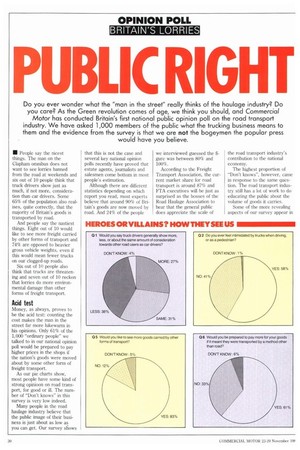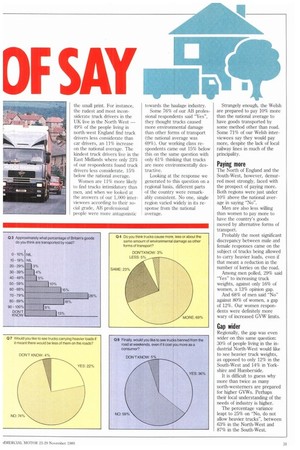GIFT CIF SAY
Page 32

Page 33

If you've noticed an error in this article please click here to report it so we can fix it.
Do you ever wonder what the "man in the street" really thinks of the haulage industry? Do you care? As the Green revolution comes of age, we think you should, and Commercial Motor has conducted Britain's first national public opinion poll on the road transport industry. We have asked 1,000 members of the public what the trucking business means to them and the evidence from the survey is that we are not the bogeymen the popular press would have you believe.
• People say the nicest things. The man on the Clapham omnibus does not want to see lorries banned from the road at weekends and six out of 10 people think that truck drivers show just as much, if not more, consideration than car drivers. Some 65% of the population also realises, quite correctly, that the majority of Britain's goods is transported by road.
And people say the nastiest things. Eight out of 10 would like to see more freight carried by other forms of transport and 74% are opposed to heavier gross vehicle weights, even if this would mean fewer trucks on our clogged-up roads.
Six out of 10 people also think that trucks are threatening and seven out of 10 reckon that lorries do more environmental damage than other forms of freight transport.
Acid test
Money, as always, proves to be the acid test counting the cost makes the man in the street far more lukewarm in his opinions. Only 61% of the 1,000 "ordinary people" we talked to in our national opinion poll would be prepared to pay higher prices in the shops if the nation's goods were moved about by some other form of freight transport.
As our pie charts show, most people have some kind of strong opinioon on road transport, for good or ill. The number of "Don't knows" in this survey is very low indeed.
Many people in the road haulage industry believe that the public image of their business is just about as low as you can get. Our survey shows that this is not the case and several key national opinion polls recently have proved that estate agents, journalists and salesmen come bottom in most people's estimation.
Although there are different statistics depending on which report you read, most experts believe that around 90% of Britain's goods are now moved by road. And 24% of the people we interviewed guessed the figure was between 80% and 100%.
According to the Freight Transport Association, the current market share for road transport is around 87% and ETA executives will be just as surprised as the bosses of the Road Haulage Association to hear that the general public does appreciate the scale of the road transport industry's contribution to the national economy.
The highest proportion of "Don't knows", however, came in response to the same question. The road transport industry still has a lot of work to do educating the public about the volume of goods it carries.
Some of the more revealing aspects of our survey appear in the small print. For instance, the rudest and most inconsiderate truck drivers in the UK live in the North West — 49% of the people living in north-west England find truck drivers less considerate than car drivers, an 11% increase on the national average. The kindest truck drivers live in the East Midlands where only 23% of our respondents found truck drivers less considerate, 15% below the national average.
Women are 11% more likely to find trucks intimidatory than men, and when we looked at the answers of our 1,000 interviewees according to their social grade, AB professional people were more antagonistic towards the haulage industry.
Some 76% of our AB professional respondents said "Yes", they thought trucks caused more environmental damage than other forms of transport (the national average was 69%). Our working class respondents came out 15% below this on the same question with only 61% thinking that trucks are more environmentally destructive.
Looking at the response we generated to this question on a regional basis, different parts of the country were remarkably consistent. No one, single region varied widely in its response from the national average. Strangely enough, the Welsh are prepared to pay 10% more than the national average to have goods transported by some method other than road. Some 71% of our Welsh interviewees say they would pay more, despite the lack of local railway lines in much of the principality.
Paying more
The North of England and the South-West, however, demurred most strongly, faced with the prospect of paying more. Both regions were just under 10% above the national average in saying "No".
Men are also less willing than women to pay more to have the country's goods moved by alternative forms of transport.
Probably the most significant discrepancy between male and female responses came on the subject of trucks being allowed to carry heavier loads, even if that meant a reduction in the number of lorries on the road.
Among men polled, 29% said "Yes" to increasing truck weights, against only 16% of women, a 13% opinion gap.
And 68% of men said "No" against 80% of women, a gap of 12%. Our women respondents were definitely more wary of increased GVW limits.
Gap wider
Regionally, the gap was even wider on this same question: 30% of people living in the industrial North-West would like to see heavier truck weights, as opposed to only 12% in the South-West and 14% in Yorkshire and Humberside.
It is difficult to guess why more than twice as many north-westerners are prepared for higher GVWs. Perhaps their local understanding of the needs of industry is higher.
The percentage variance leapt to 25% on "No, do not allow heavier trucks", between 63% in the North-West and 87% in the South-West.




































































































































































